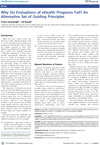
The approach to evaluation presented in the previous PLoS Medicine series rests on a set of assumptions that philosophers of science call "positivist": that there is an external reality that can be objectively measured; that phenomena such as "project goals", "outcomes", and "formative feedback" can be precisely and unambiguously defined; that facts and values are clearly distinguishable; and that generalisable statements about the relationship between input and output variables are possible.
Read on-line: Why Do Evaluations of eHealth Programs Fail? An Alternative Set of Guiding Principles
Download from eHealthNews.eu Portal's mirror: Why Do Evaluations of eHealth Programs Fail? An Alternative Set of Guiding Principles (.pdf, 99 KB).
Citation: Greenhalgh T, Russell J (2010) Why Do Evaluations of eHealth Programs Fail? An Alternative Set of Guiding Principles. PLoS Med 7(11): e1000360. doi:10.1371/journal.pmed.1000360
Copyright: © 2010 Greenhalgh, Russell. This is an open-access article distributed under the terms of the Creative Commons Attribution License, which permits unrestricted use, distribution, and reproduction in any medium, provided the original author and source are credited.